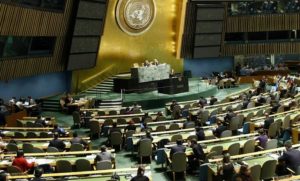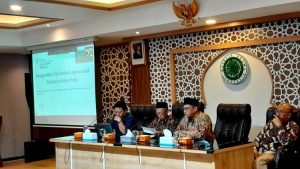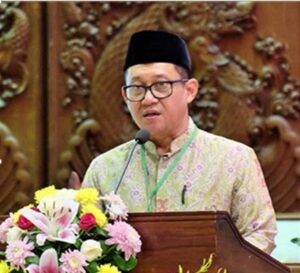By: Dr. Hayu Prabowo, the Chair of Indonesian Ulema Council (MUI) for Environmental & Natural Resources Breeding.
Based on data from the National Disaster Management Agency (BNPB), throughout 2019, the total disasters that hit Indonesian territory reached 3,721. As a result, 477 died and 109 were lost and 3,415 injured. The high number of disasters that always hit Indonesia put Indonesia in the position of the two countries with the most fatalities disasters in the last 20 years.
The 2009-2019 Indonesian Disaster Trends from BNPB show that:
In general, disaster trends continue to increase every year. Until December 27, 2019, 3,768 disasters have occurred. Floods, landslides, and tornadoes still dominate.
Also Read: Verses of the Universe in Gaza: The Unyielding Light of Faith
The increasing trend of natural disasters has been predicted by experts in line with the increase in earth’s temperature which resulted in global climate change so that the earth’s weather is increasingly extreme locally.
Factor of Extreme Weather in The Earth
Greenhouse gases (including carbon dioxide and methane) naturally occur in the earth’s atmosphere to capture the sun’s heat and warm the earth in such a way that the earth’s temperature can support life. This naturally occurring process is known as the greenhouse effect. Without this process, the earth will become too cold to support life.
However, as more greenhouse gas is released from human activities into the atmosphere, the greenhouse gas strengthens the natural effect, thereby increasing the average temperature of the earth, known as global warming.
Also Read: Prophet Sulaiman Alaihi Salam, the Greatest Muslim King of All Time
Global warming will increase the evaporation of earth’s surface water, causing extreme drought. With higher temperatures, the amount of water vapor contained in the air will increase too, so that when it rains, it will be very extreme which results in damage. This what is called the earth’s climate change will cause the earth’s weather to be extreme (extreme drought or extreme rain) which damages the balance of the ecosystem as a supporter of human life and all creatures.
As a result of the exploitative human behavior towards the earth has resulted in damage to the balance of ecosystem. It will impact on humans themselves with increasing crop failure and world food security and the vulnerability of water availability. The crisis of these two staples of life will increase the potential for social unrest and security vulnerabilities both nationally and globally.
Tropical Forests and Climate Change
The future of tropical forests and global climate control are closely interrelated. Addressing deforestation is an important part of the solution to climate change.
Also Read: Imaam Yakhsyallah Mansur: Surah At-Tin Indicates the Command to Liberate Al-Aqsa
Forests are a storehouse of natural carbon, although some analysts recommend capturing and storing carbon using technology, but the technology is expensive and has not been proven. Indeed, forests are the only system that is safe, natural, and currently available to capture and store carbon on a large scale.
Through the natural process of photosynthesis, trees absorb carbon dioxide (CO2) from the atmosphere, if excess carbon dioxide, it will contribute to climate change. Trees store the carbon safely in their trunks, branches and leaves.
Conversely, when forests are burned, cut or destroyed, the carbon stored by these forests is released back into the atmosphere, which results in climate change. Deforestation also reduces the capacity of forests to reabsorb carbon from the atmosphere because the area of tree cover decreases.
Tropical forests provide invaluable services for humanity and for the universe through absorption of carbon dioxide emissions. However, tropical forests are destroyed in such a way, even though the potential of tropical forests is huge to absorb carbon, tropical forests are actually a source of greenhouse gas emissions.
Also Read: Imaam Yakhsyallah: Nurture Love for the Prophet, One Will Be with Whom One Loves
We cannot possibly tackle climate change without protecting forests. Forest returns and sustainable forest management are also the most economical choices for reducing emissions.
Protecting and restoring forests will provide additional social, economic and environmental benefits, outside of climate change mitigation, including improving food security, pollination, pest control, water supply, control of soil erosion, and many other ecosystem services.
The Role of Religious Communities
The environmental crisis with its various manifestations such as climate change and global warming is actually a moral crisis, because humans view nature as an object not a subject in universal life. So, the handling of existing problems must be a moral approach. At this point, religion must play a role.
Also Read: Friday Sermon: Emulating the Firmness of the Prophet in Struggle
Religious people and spiritual communities play a unique role in protecting Indonesia’s tropical forests and supporting indigenous peoples. Concern for nature is the teachings of the world’s religion and now is the time to strengthen and mobilize spiritual resources, influence, and moral authority to jointly affirm that protecting tropical forests is the glory and deforestation of tropical forests harms the glory of life.
Religious communities in Indonesia can take steps in various fields, including regulating personal choices and working through religious institutions to encourage education about values and threats to tropical forests, advocate for protection of tropical forests, and seek political initiatives that oppose deforestation and support the rights of indigenous peoples.
The benefits derived from gathering religious power in efforts to reduce deforestation will multiply when the world’s major religions stand side by side together.
When religious communities show the ability to work together, they will build credibility and trust from the wider community. When they speak with one voice on matters such as forest protection, their moral authority is increasingly strengthened, giving them the ability to influence policy through their influence on individuals and institutions.
Also Read: Imaam Yakhsyallah: Muslims Unity as Key to Victory of Islam
Interfaith Initiative for Tropical Forests
The Interfaith Initiative for Tropical Forests or the Interfaith Rainforest Initiative (IRI) is an interfaith international alliance that seeks to provide moral urgency and faith-based leadership to global efforts to end tropical deforestation.
IRI is a forum for religious leaders and religious communities to work hand in hand with indigenous peoples, governments, NGOs and business people in relation to actions to protect tropical forests and the rights of those who act as protectors. This initiative believes that the time has come for the world movement to care for tropical forests, which are based on values inherent in forests and inspired by religious values, ethics and moral guidelines.
Indonesia’s important position as one of the five countries that have more than 70 percent of the world’s remaining tropical forests, the United Nations Environment Program (UNEP), Indonesia’s interfaith organization and interfaith partner, plans to conduct workshops, dialogues and launch IRI programs Indonesia from 30 to 31 January 2020 in Jakarta.
Also Read: Friday Sermon: Prophet Muhammad Is Not a Political Figure
The event will be attended by 200 participants from 12 provinces in Indonesia consisting of proponents, leaders of religious assemblies, indigenous peoples, experts, NGOs, governments, and international organizations that are currently working hand in hand in the country of Brazil, Colombia, Congo and Peru through the Interfaith Rainforest Initiative, namely the United Nations, Religions for Peace, Norway’s Rainforest Foundation, and GreenFaith.
Subsequently on February 1, an advisory board will be formed for the Interfaith Initiative for Forests to provide strategic advice and direction on substantive matters relating to the Interfaith Initiative for Tropical Forests in their respective countries and bring the voice of stakeholders to support the implementation of national level activities through its Executive Board. (AT/RE1)
Mi’raj News Agency (MINA)
Also Read: Without Knowledge, Congregation Is Merely a Crowd Without Direction











![Israeli tanks and APC’s gather by the Israeli – Lebanese border. Amid Israel’s escalating campaign against Hezbollah in Lebanon on September 30, 2024. [Erik Marmor/Getty Images]](https://en.minanews.net/wp-content/uploads/2024/10/IMG_20241001_203226-300x197.jpg)





















 Mina Indonesia
Mina Indonesia Mina Arabic
Mina Arabic